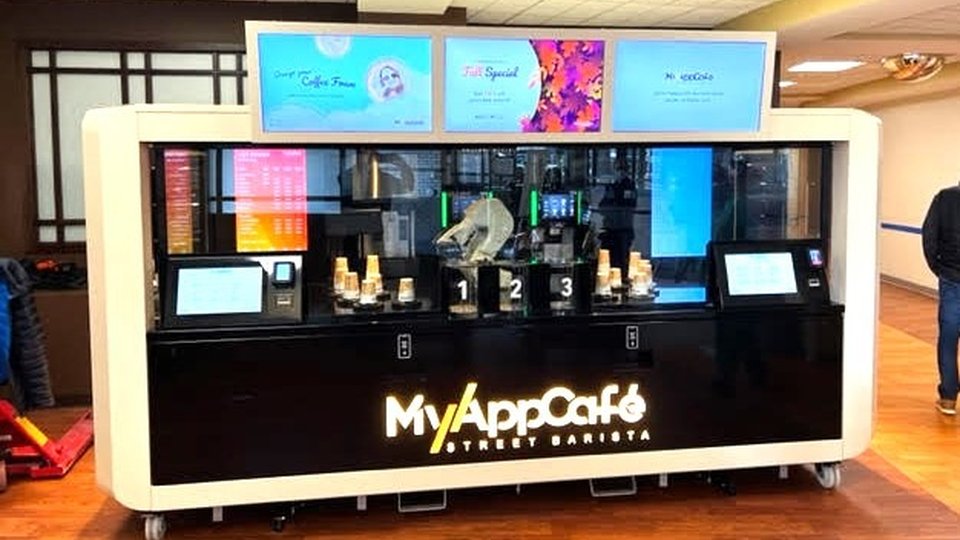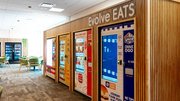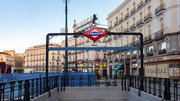Coffee Service
Robotic barista offers high quality coffee 24/7 for hospital staff, visitors
The Robojo uses a robotic arm to prepare and serve coffee in a cup in just 60 seconds. The machine includes a bean grinder, bean hoppers, powder flavor hoppers, a milk refrigerator and an ice dispenser.

June 29, 2022 by Elliot Maras — Editor, Kiosk Marketplace & Vending Times
Doctors, nurses and hospital staff are always on call. They never know when they'll need to stop what they're doing and respond to a patient emergency.
Which is why reliable, high quality refreshment, food and nutrition services are necessary 24/7.
The need is especially challenging for facilities like Doctors Hospital, a 225-bed hospital in Columbus, Ohio, that does not have 24-hour retail services available onsite.
 | |
Heather Buck |
Meeting that need falls largely to Heather Buck, senior director of food and nutrition services for OhioHealth, an Ohio hospital network, who keeps a close eye on technology that can meet staff and patient needs when onsite retail facilities are not available.
A resource emerges
Fortunately, Buck has found a helpful resource in Zink Foodservice, a local provider of custom foodservice solutions that keeps up on foodservice technology.
"We were keeping our eyes open for a resource to emerge so that we can fill a void that we have on off' shifts," Buck told Vending Times in a recent phone interview.
The first solution Zink suggested was a self-serve, robotic frozen yogurt vending machine, Reis & Irvy's, which Buck said has been very successful.
A more pressing need, however, was coffee. Feedback from staff indicated a need for readily available, good coffee when the onsite retail services were closed outside of the 7 a.m. to 7 p.m. window. Good coffee was not always available, and people were going offsite to get it.
The answer: a self-serve, robotic barista bar.
In the past year and a half, Zink Foodservice formed a partnership with a fully automated robotic coffee machine manufacturer that provided just the solution.
A robotic barista
The Robojo machine, six-and-a-half-feet-high-by-12 feet wide, placed in the hospital lobby in February, uses a robotic arm to prepare and serve coffee in a cup in just 60 seconds. With two POS terminals, the machine — which includes a bean grinder, bean hoppers, four powder flavor hoppers, a milk refrigerator and an ice dispenser –—can service four drinks at a time.
Customers can also order and pay using the app at the machine's two barcode scanners.
 |
The robotic barista bar was a way to reward employees and at the same time create new revenue without additional labor. |
For Doctors Hospital, the robotic barista bar was a way to reward employees and at the same time create new revenue without additional labor.
The hospital sells about 100 cups per day.
An optimum solution
"This machine really provided a solution for us to number one, provide an opportunity to get coffee 24 hours a day but also without taking any jobs away from anybody else," Buck said.
The coffee is priced similar to coffee shops and makes 250 different coffee variations, both hot and iced, as well as hot chocolate.
The associates love the order app, she said. "The transaction is really frictionless." Those without an app can order at the machine touchscreen and pay using Apple Pay or a credit card.
The hospital staff spends about 45 minutes a day activating the machine's self-cleaning process and replenishing the coffee and the milk.
"We didn't want anything that's extra for our food and nutrition associates to do," Buck said, referring to Morrison Healthcare, OhioHealth's foodservice contractor. "We are able to absorb that 45 minutes in cleaning and stocking into someone's daily cleaning routine and it did not add labor to anybody."
Partnership brings European technology to U.S.
Doctors Hospital marks the first placement for Robojo, a partnership between Zink Foodservice and some outside investors.
Robojo's partners, led by CEO Ben Czajka, came across the MyApp Café machine in Germany where it was operating robotic baristas in shopping malls. The German manufacturer, WMF GmbH, built the American unit to Robojo's specs. Robojo, based Columbus, is the North America distributor for MyApp Café.
"When this came on the market, they (OhioHealth) were very interested looking for…obviously the same thing everybody else is; how can we still sell product and not have any more labor?" Drew Patterson, Robojo product manager for Zink Foodservice, told Vending Times in a phone interview. "Now they're generating revenue in a time space they never had before."
A theatrical attraction
Once the unit was installed, the hospital realized a theatrical aspect in the way the robot swings the coffee cup around and waves at the customer when the coffee is ready, Patterson said. It also has bright menu boards.
"There's something to watch and see," Patterson said. "They (the hospital) saw that as very exciting. Robojo lets you know it's working and ready to take an order."
The client, in this case OhioHealth, is also able to choose what coffee they want to offer in the machine, Patterson said. OhioHealth selected a local coffee provider called Rooted Grounds as well as compostable coffee cups.
The machine can produce up to 100 cups per hour, the volume of four baristas, and the utility cost is far lower than that of a manned shop, Patterson said.
"People now are looking for quality beverages and barista style drinks," said Mike McGuire, managing partner, Zink Foodservice, in a phone interview. "This is a high quality product that we can adjust to their wants and needs; it adds flavors to it, it's a lot more than you would get from a (regular) machine."
In addition, "It's more economical than going to a local coffee shop," he said.
The feedback has been positive, McGuire said, and the unit has generated a lot of media and social media coverage.
Buck plans to introduce Robojo to other OhioHealth hospitals that do not offer 24-hour retail services.
"There was no café at all," Buck said. "Now there is this robotic technology that fits that need. Now you can get a cappuccino, a latte, espresso, really high-end European style coffees without having to go across the street to a competitor to buy it."
About Elliot Maras
Elliot Maras is the editor of Kiosk Marketplace and Vending Times. He brings three decades covering unattended retail and commercial foodservice.
 ChatGPT
ChatGPT Grok
Grok Perplexity
Perplexity Claude
Claude






